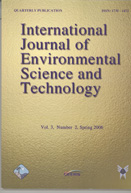
|
International Journal of Environment Science and Technology
Center for Environment and Energy Research and Studies (CEERS)
ISSN: 1735-1472
EISSN: 1735-1472
Vol. 6, No. 4, 2009, pp. 563-570
|
 Bioline Code: st09062
Bioline Code: st09062
Full paper language: English
Document type: Research Article
Document available free of charge
|
|
|
International Journal of Environment Science and Technology, Vol. 6, No. 4, 2009, pp. 563-570
| en |
Anisotropy and bedding effects on the hydro geological regime in a confined aquifer to design an appropriate dewatering system
Aryafar, A. & Ardejani, F. Doulati
Abstract
Prediction of groundwater inflow into mining excavations is very important in order to design an
effective dewatering system to keep the mine workings dry and create prolonged cone of depression. The effects of
anisotropy ratio and bedding on the hydraulic head and drawdown curves of a dewatering test carried out in a fully
penetrating well in a confined aquifer have been investigated. An existing numerical finite element model has been used
to perform the simulations. The results of the numerical model are compared to those from analytical Jacob and
Lohman solution for estimating hydraulic heads and drawdown curves. It was found that the anisotropy ratio and
bedding should not have a significant effect on drawdown and the quantity of inflow into a confined aquifer. It was
further found that taking the simultaneous effects of anisotropy and bedding into account reduces the differences in the
results of analytical and numerical methods. Comparison of the field data and model predictions showed that, the
modelling results for a three layer anisotropic aquifer fit well to the field data than those results obtained for a single
layer aquifer and the relative error decreased from 4.81 % to 2.98 %.
Keywords
Analytical solution; Finite element; Inflow; Groundwater; Numerical model
|
| |
© Copyright 2009 Center for Environment and Energy Research and Studies (CEERS)
Alternative site location: http://www.ijest.org
|
|
